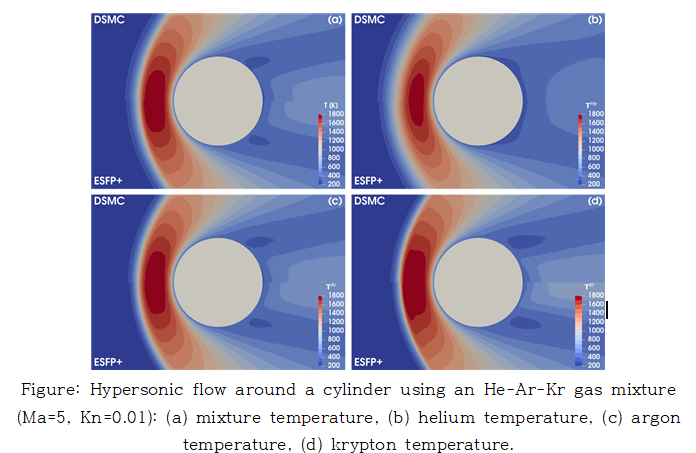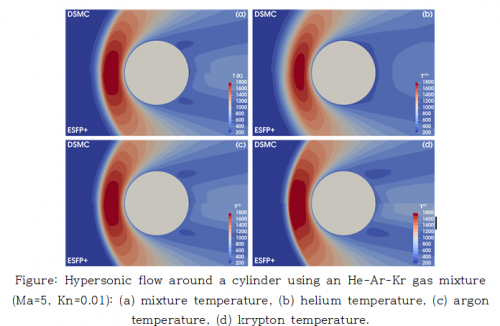Major research outcome
- Ph.D. Candidate Sanghun Kim and Professor Eunji Jun: A particle Fokker-Planck model for rarefied gas of monatomic mixtures
- 관리자 |
- 2025-01-06 15:29:26|
- 178
- 2025-01-06 15:29:26|
At higher altitudes, the air density decreases, making it challenging to apply the Navier-Stokes equations due to the continuum assumption. To accurately describe the behavior of rarefied flows, the Direct Simulation Monte Carlo (DSMC) method is commonly employed. The DSMC method, based on the Boltzmann equation, is a particle-based technique used to model particle motion and collisions, providing physically accurate results across a wide range of rarefaction. However, in DSMC, particle collisions can lead to significant computational costs as density increases. To address this computational cost issue, the particle-based Fokker-Planck method has been studied. The Fokker-Planck equation approximates particle interactions as Brownian motion, eliminating the need to resolve the collisional scale. Therefore, the Fokker-Planck method is expected to offer improved computational efficiency compared to the DSMC method near the continuum regime.
Recently, Ph.D. candidate Sanghun Kim and Professor Eunji Jun developed a new Fokker-Planck method for monatomic gas mixtures. The newly proposed model incorporates momentum, energy, shear stress, and heat flux exchange mechanisms between species, making it applicable to rarefied hypersonic gas flows. This research has been published in the 37th volume, issue 1 of the Physics of Fluids (POF) journal in 2025. Physics of Fluids is a leading journal in fluid mechanics, known for publishing high-quality research across the field of flow dynamics (IF: 4.1, top 5% in JCR).
Title: A particle Fokker–Planck method for rarefied ssssgas flows of monatomic mixtures
DOI: https://doi.org/10.1016/j.jcp.2024.112940

Recently, Ph.D. candidate Sanghun Kim and Professor Eunji Jun developed a new Fokker-Planck method for monatomic gas mixtures. The newly proposed model incorporates momentum, energy, shear stress, and heat flux exchange mechanisms between species, making it applicable to rarefied hypersonic gas flows. This research has been published in the 37th volume, issue 1 of the Physics of Fluids (POF) journal in 2025. Physics of Fluids is a leading journal in fluid mechanics, known for publishing high-quality research across the field of flow dynamics (IF: 4.1, top 5% in JCR).
Title: A particle Fokker–Planck method for rarefied ssssgas flows of monatomic mixtures
DOI: https://doi.org/10.1016/j.jcp.2024.112940

| Attach File |
|---|


